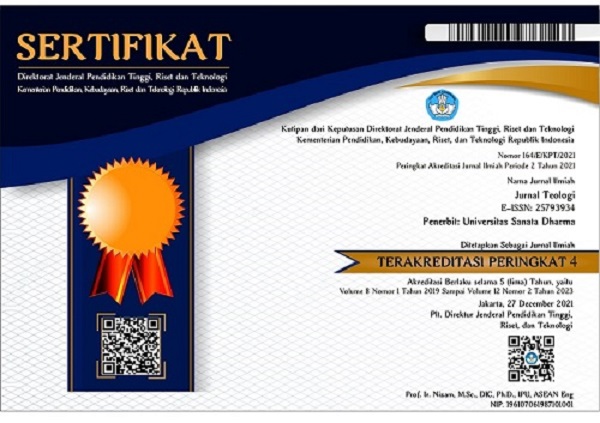YESUS KRISTUS SANG JALAN : KRISTOLOGI KONTEKSTUAL BAGI PENGHAYAT KEBATINAN KATOLIK
(1) Alumnus Magister Teologi Universitas Sanata Dharma
(*) Corresponding Author
Abstract
After His Resurrection and Ascension, the disciples tried to understand who Jesus really was. Thus, the formulations of Jesus as God, Son of God, Christ and so forth, came into their consciousness. These such formulations were growing in accordance with the particular social context in which the Christian faith was proclaimed. An attempt to find a formula of Jesus Christ in various contexts is what is known as the contextual christology. The emergence of liberation theology in the second half of the 20th century gave birth to the realization that theology always has a context, has a background and also deals with particular concerns. Therefore, christology as one of the branches of theology also needs to pay attention to the context. Contextual Christology for the Javanese Catholic mystics encourages the followers of Jesus Christ to always walk in Him. Given that He is no longer present in the earthly form, the presence of spiritual formation and mystical exercise in a personal relationship with Jesus Christ are to be pursued. This is where the role of the Holy Spirit, as Jesus promised helper, is present. In every prayer and mystical exercise of the Javanese Catholic mystics, the assertion in the Holy Spirit that Jesus Christ is the Way is experienced. The ultimate goal of all this is the full union with God the Father, the Son and the Holy Spirit in the House of the Father (cf. Jn 14:2).
Full Text:
PDFDOI: https://doi.org/10.24071/jt.v4i2.469
Refbacks
- There are currently no refbacks.

This work is licensed under a Creative Commons Attribution-ShareAlike 4.0 International License.
.jpg)
Indexed and abstracted in:
P-ISSN: 2302 - 5476 (Validity starting Volume 2012-10-05)
E-ISSN: 2579 - 3934 (Validity starting Volume 6, No. 1, Mei 2017)
Jurnal Teologi (Journal of Theology) by Faculty of Theology Sanata Dharma University

This work is licensed under a Creative Commons Attribution-ShareAlike 4.0 International License.














